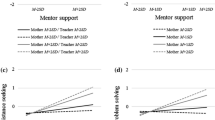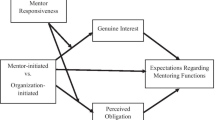Abstract
The quality of the relationships that mentors forge with their protégés is assumed to significantly affect the success of mentoring interventions. Building on previous research, this study examined the association between relationship qualities and protégé functioning. Multiple reporters (e.g., mentors, protégés and teachers) were used in a prospective research design spanning eight months in Israel’s largest mentoring program—Perach. The sample consisted of 84 protégés ranging in age from 8 to 13 years (M = 10.75). Qualities in the mentoring relationship such as closeness, dependency and unrealistic expectations for the continuation and deepening of the relationship, beyond the planned period, were positively associated with the children’s social and academic adjustment, and contributed to perceived academic competence, social support and wellbeing. Generalization of positive mentoring experiences to other relationships (such as the mother–child relationship) and the role of unrealistic expectations and dependency as key elements are considered. Implications of the findings for research and mentoring intervention are discussed.
Similar content being viewed by others
References
Beam, M. R., Chen, C., & Greenberger, E. (2002a). The nature of adolescents’ relationships with their “very important” nonparental adults. American Journal of Community Psychology, 30, 305–325. doi:10.1023/A:1014641213440.
Beam, M. R., Gil-Rivas, V., Greenberger, E., & Chen, C. (2002b). Adolescent problem behavior and depressed mood: Risk and protection within and across social contexts. Journal of Youth and Adolescence, 31, 343–357. doi:10.1023/A:1015676524482.
Bereiter, C. (1963). Some persisting dilemmas in the measurement of change. In C. Harris (Ed.), Problems in measuring change (pp. 3–20). Madison: University of Wisconsin Press.
Brock, D., Sarason, I., Sarason, B., & Pierce, G. (1996). Simultaneous assessment of perceived global and relationship-specific support. Journal of Social and Personal Relationships, 13, 143–152. doi:10.1177/0265407596131008.
Cavell, T. A., Meehan, B. T., Heffer, R. W., & Holladay, J. J. (2002). The natural mentors of adolescent children of alcoholics (COAs): Implications for preventive practices. The Journal of Primary Prevention, 23, 23–42. doi:10.1023/A:1016587115454.
Chang, E. C., & Sanna, L. J. (2003). Optimism, accumulated life stress, and psychological and physical adjustment: Is it always adaptive to expect the best. Journal of Social and Clinical Psychology, 22, 97–115. doi:10.1521/jscp.22.1.97.22767.
Cook, W., & Goldstein, M. (1993). Multiple perspectives on family relationships: A latent variable model. Child Development, 64, 1377–1388. doi:10.2307/1131540.
Cronbach, L. J., & Furby, L. (1970). How we should measure “change”—or should we? Psychological Bulletin, 74, 68–80. doi:10.1037/h0029382.
DuBois, D. L., Holloway, B. E., Valentine, J., & Cooper, H. (2002). Effectiveness of mentoring programs for youth: A meta-analytic review. American Journal of Community Psychology, 30, 157–197. doi:10.1023/A:1014628810714.
DuBois, D. L., & Neville, H. A. (1997). Youth mentoring: Investigation of relationship characteristics and perceived benefits. Journal of Community Psychology, 25, 227–234. doi:10.1002/(SICI)1520-6629(199705)25:3<227::AID-JCOP1>3.0.CO;2-T.
DuBois, D. L., & Silverthorn, N. (2005). Characteristics of natural mentoring relationships and adolescent adjustment: Evidence from a national study. The Journal of Primary Prevention, 26, 69–92. doi:10.1007/s10935-005-1832-4.
Eby, L. T., Allen, T. D., Evans, S. C., Ng, T., & DuBois, D. L. Does mentoring matter? A multidisciplinary meta-analysis comparing mentored and non-mentored individuals. Journal of Vocational Behavior (in press).
Eisenberg, T., Fresko, B., & Carmeli, M. (1983). A follow-up study of disadvantaged children two years after being tutored. The Journal of Educational Research, 76, 302–306.
Fournier, M., de Ridder, D., & Bensing, J. (2002). Optimism and adaptation to chronic disease: The role of optimism in relation to self-care options of type 1 diabetes mellitus, rheumatoid arthritis and multiple sclerosis. British Journal of Health Psychology, 7, 409–432. doi:10.1348/135910702320645390.
Hisherik, M. (2004). Perach: The rational, its scope, operation, and contribution to the pupils and mentors. Unpublished report for internal use (in Hebrew). Beit-Berl, Kfar Saba, Israel: Beit-Berl College—The Unit for Research and Evaluation in Teaching and Education.
Fresko, B., & Eisenberg, T. (1985). The effect of two years of tutoring on mathematics and reading achievement. Journal of Experimental Education, 53, 193–201.
Furman, W., & Buhrmester, D. (1985). Children’s perceptions of the personal relationships in their social networks. Developmental Psychology, 21, 1016–1024. doi:10.1037/0012-1649.21.6.1016.
Granot, D., & Mayseless, O. (2001). Attachment security and adjustment to school in middle childhood. International Journal of Behavioral Development, 25, 530–541. doi:10.1080/01650250042000366.
Greenberger, E., Chen, C., & Beam, M. R. (1998). The role of “very important” nonparental adults in adolescent development. Journal of Youth and Adolescence, 27, 321–343. doi:10.1023/A:1022803120166.
Grossman, J. B., & Rhodes, J. E. (2002). The test of time: Predictors and effect of duration in youth mentoring relationships. American Journal of Community Psychology, 30, 199–219. doi:10.1023/A:1014680827552.
Grossman, J. B., & Tierney, J. P. (1998). Does mentoring work? An impact study of the Big Brothers Big Sisters program. Evaluation Review, 22, 403–426. doi:10.1177/0193841X9802200304.
Hamre, B. K., & Pianta, R. C. (2001). Family, school, and community early teacher–child relationships and the trajectory of children’s school outcomes through eighth grade. Child Development, 72, 625–638. doi:10.1111/1467-8624.00301.
Harold, G. T., & Conger, R. D. (1997). Marital conflict and adolescent distress: The role of adolescent awareness. Child Development, 68, 333–350.
Hightower, A. D., Work, W. C., Cowen, E. L., Lotyczewski, B. S., Spinell, A. P., Guare, J. C., et al. (1986). The Teacher–Child Rating Scale: A brief objective measure of elementary children’s school problem behavior and competencies. School Psychology Review, 15, 393–409.
Kashani, J. H., Canfield, L. A., Borduin, C. M., Soltys, S. M., & Reid, J. C. (1994). Perceived family and social support: Impact on children. Journal of the American Academy of Child and Adolescent Psychiatry, 33, 819–823. doi:10.1097/00004583-199407000-00007.
Klaw, E. L., & Rhodes, J. E. (1995). Mentor relationships and the career development of pregnant and parenting African-American teenagers. Psychology of Women Quarterly, 19, 551–562. doi:10.1111/j.1471-6402.1995.tb00092.x.
Langhout, R. D., Rhodes, J. E., & Osborne, L. N. (2004). An exploratory study of youth mentoring in an urban context: Adolescents’ perceptions of relationship. Journal of Youth and Adolescence, 33, 293–306. doi:10.1023/B:JOYO.0000032638.85483.44.
Larson, R. (2006). Positive youth development, willful adolescents, and mentoring. Journal of Community Psychology, 34, 677–689. doi:10.1002/jcop.20123.
Levi-Shiff, R., Vakil, E., Dimistrovsky, L., Abramovitz, M., Shahar, N., & Har-Even, D. (1998). Medical, cognitive, emotional, and behavioral outcomes in school age children conceived by in vitro fertilization. Journal of Clinical Child Psychology, 27, 320–329. doi:10.1207/s15374424jccp2703_8.
Lynch, M., & Cicchetti, D. (1991). Patterns of relatedness in maltreated and nonmaltreated children: Connections among multiple representational models. Development and Psychopathology, 3, 207–226.
Lynch, M., & Cicchetti, D. (1992). Maltreated children’s reports of relatedness to their teachers. In R. C. Pianta (Ed.), Beyond the parent: The role of other adults in children lives (pp. 81–107). San Francisco: Jossey Bass.
Mayseless, O. (1998). Growing up in Israel: Attitudes and values of Israeli youth in the last decade. Educational Counseling, 7, 87–102. in Hebrew.
Mayseless, O., & Salomon, G. (2003). Dialectic contradictions in the experiences of Israeli Jewish adolescents: Efficacy and stress, closeness and friction, and conformity and non-compliance. In F. Pajares & T. Urdan (Eds.), Adolescence and education, vol.III: International perspectives on adolescence (pp. 149–171). Greenwich, CT: Information Age Publishing.
Mayseless, O., & Scharf, M. (2003). What does it mean to be an adult? The Israeli experience. New Directions for Child and Adolescent Development, 100, 5–20. doi:10.1002/cd.71.
McAuley, M. J. (2003). Transference, countertransference and mentoring: The ghost in the process. British Journal of Guidance & Counselling, 31, 12–23. doi:10.1080/0306988031000086134.
Miller, A. (2002). Mentoring students and young people: A handbook of effective practice. London: Routledge.
Nakkula, M. J., & Harris, J. T. (2005). Assessment of mentoring relationships. In D. L. DuBois & M. J. Karcher (Eds.), The handbook of youth mentoring (pp. 100–117). California: Sage Publications.
Parra, G. R., DuBois, D. L., Neville, H. A., Pugh-Lilly, A., & Povinelli, N. (2002). Mentoring relationships for youth: Investigation of a process-oriented model. Journal of Community Psychology, 30, 367–388. doi:10.1002/jcop.10016.
Peres, Y., & Katz, R. (1981). Stability and centrality: The nuclear family in modern Israel. Social Forces, 59, 687–704. doi:10.2307/2578189.
Pianta, R. C., & Steinberg, M. S. (1992). Teacher–child relationships and process of adjusting to school. In R. C. Pianta (Ed.), Beyond the parent: The role of other adults in children lives (pp. 61–79). San Francisco: Jossey Bass.
Pianta, R. C., Steinberg, M. S., & Rollins, K. B. (1995). The first two years of school: Teacher–child relationships and deflections in children’s classroom adjustment. Development and Psychopathology, 7, 295–312.
Rhodes, J. E. (1994). Older and wiser: Mentoring relationships in childhood and adolescence. The Journal of Primary Prevention, 14, 187–195. doi:10.1007/BF01324592.
Rhodes, J. E. (2002). Stand by me: The risks and rewards of mentoring today’s youth. Cambridge, MA: Harvard University Press.
Rhodes, J. E., Bogat, A., Roffman, J., Edelman, P., & Galasso, L. (2002). Youth mentoring in perspective: Introduction to special issue. American Journal of Community Psychology, 30, 149–155. doi:10.1023/A:1014676726644.
Rhodes, J. E., Contreras, J. M., & Mangelsdorf, S. C. (1994). Natural mentor relationships among Latina adolescent mothers: Psychological adjustment, moderating process, and the role of early parental acceptance. American Journal of Community Psychology, 22, 211–227. doi:10.1007/BF02506863.
Rhodes, J. E., & DuBois, D. L. (2006). Understanding and facilitating the youth mentoring movement. Social Policy Report, 20, 3–20.
Rhodes, J. E., Grossman, J. B., & Resch, N. (2000). Agents of change: Pathways through which mentoring relationships influence adolescent’s academic adjustment. Child Development, 71, 1662–1671. doi:10.1111/1467-8624.00256.
Rhodes, J. E., Haight, W. L., & Briggs, E. C. (1999). The influence of mentoring on the peer relationships of foster youth in relative and non relative care. Journal of Research on Adolescence, 9, 185–201. doi:10.1207/s15327795jra0902_4.
Rhodes, J. E., Reddy, R., Roffman, J., & Grossman, J. B. (2005). Promoting successful youth mentoring relationships: A preliminary screening questionnaire. The Journal of Primary Prevention, 26, 147–201. doi:10.1007/s10935-005-1849-8.
Rhodes, J. E., Spencer, R., Keller, T., Liang, B., & Noam, G. (2006). A Model for the influence of mentoring relationships on youth development. Journal of Community Psychology, 34, 691–707. doi:10.1002/jcop.20124.
Scandura, T. A. (1998). Dysfunctional mentoring relationships and outcomes. Journal of Management, 24, 449–467. doi:10.1016/S0149-2063(99)80068-3.
Sarason, I. G., Levine, H. M., Bashman, R. B., & Sarason, B. R. (1983). Assessing social support: The social support questionnaire. Journal of Personality and Social Psychology, 44, 127–139. doi:10.1037/0022-3514.44.1.127.
Schwartz, S. H. (1990). Individualism–collectivism: Critique and proposed refinements. Journal of Cross-Cultural Psychology, 21, 139–157. doi:10.1177/0022022190212001.
Schwartz, S. H. (1994). Beyond individualism/collectivism: New cultural dimensions of values. In U. Kim, et al. (Eds.), Individualism and collectivism. Thousand Oaks, CA: Sage.
Schwartz, S. H., & Bardi, A. (2001). Value hierarchies across cultures. Taking a similar perspective. Journal of Cultural Psychology, 32, 268–290. doi:10.1177/0022022101032003002.
Smilansky, S., & Shfatia, L. (1974). A research of the inventory to assess children in kindergarten and its validation refers to achievements in first and second grades (in Hebrew). Jerusalem: R. Bresler Educational Research Center.
Spencer, R. (2007). “It’s not what I expected”: A qualitative study of youth mentoring relationship failures. Journal of Adolescent Research, 22, 331–354. doi:10.1177/0743558407301915.
Weinberger, D. A., & Schwartz, G. A. (1990). Distress and restraint as super ordinate dimensions of self-reported adjustment: A typological perspective. Journal of Personality, 58, 381–417. doi:10.1111/j.1467-6494.1990.tb00235.x.
Weiss, R. (1974). The provisions of social relationships. In Z. Rubin (Ed.), Doing unto others. Joining, modeling, conforming, helping, loving (pp. 17–26). Englewood Cliffs, NJ: Prentice-Hall.
Zimmerman, M. A., Bingenheimer, J. B., & Notaro, P. C. (2002). Natural mentors and adolescent resiliency: A study with urban youth. American Journal of Community Psychology, 30, 221–243. doi:10.1023/A:1014632911622.
Author information
Authors and Affiliations
Corresponding author
Rights and permissions
About this article
Cite this article
Goldner, L., Mayseless, O. The Quality of Mentoring Relationships and Mentoring Success. J Youth Adolescence 38, 1339–1350 (2009). https://doi.org/10.1007/s10964-008-9345-0
Received:
Accepted:
Published:
Issue Date:
DOI: https://doi.org/10.1007/s10964-008-9345-0




